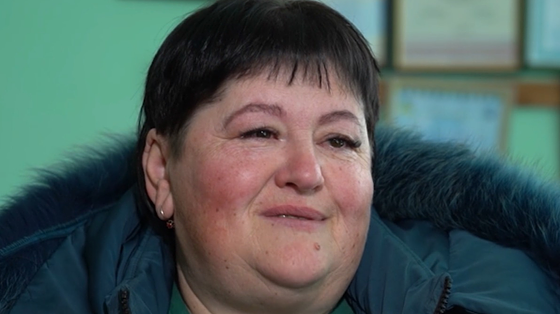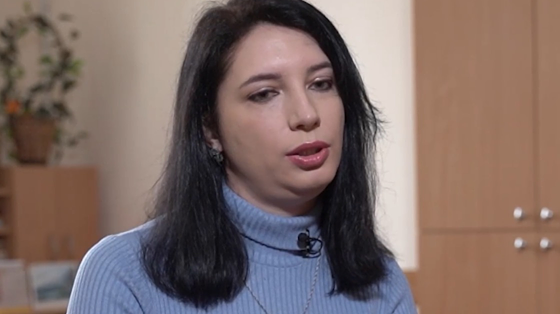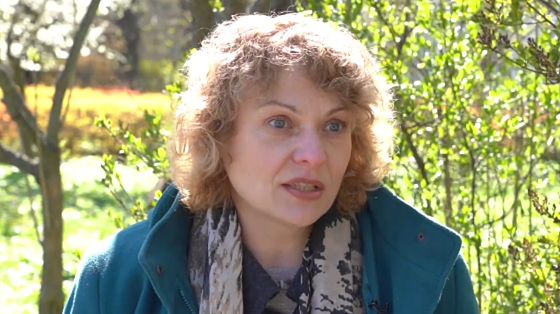‘For me, the war means...’
Death. War is, first of all, death.
When did the war in Donbass begin for you?
It is hard to recall now... It started gradually. I lived quite far from the airport, almost at the opposite end of Donetsk. Probably, when we started to hear shelling, it started to feel real. When the news was showing the airport, it was clear that there was a hotspot. As far as I remember it was in 2014, summer-autumn. Then, the situation got tougher: they announced curfew; the city was empty.
Did you happen to see military actions with your own eyes?
No, I did not see the hostilities, but I saw the areas that had been under shelling. I saw the traces of shells, some other weapons, but I was not at the centre of the action myself.
I saw the aftermath: broken windows, shelled shops, especially along Kyivskyi Avenue.
As I recall, it was the summer of 2014. I used to go to our summer house when they had already installed checkpoints: when I was driving by, I saw that the war was going on.
What did you talk about with your family and neighbours during active hostilities?
It was a feeling of anxiety. We could not believe that it would go on that far. Everybody was feeling for each other, asking for some news. It was hard to believe.
What do you remember the most from the experience you went through during the war?
Difficult to say... Continuous sounds of artillery made us nervous: when you hear shelling, you understand that something was going on, quite close. We have a feeling of anxiety especially in the evenings: it was still early (about 7-8 p.m.), but there were no people in the city centre. It was scary! As it was a big city, full of life and traffic, then, in one moment, there was nothing. A bad feeling. There were armed people, some military equipment.
What was the most important event of that war for you? Why?
Leaving the city. A decision had to be made either to stay there or to leave. Making that decision was a milestone for me.
Luckily, my family, close ones and friends have not suffered from this war directly. But I had to leave the place where I had been born and lived my entire life.
We tend to erase unpleasant events from our memory.
You cannot forget, and I do not want to forget. I have not witnessed the real war horrors. I have seen the aftermath but when you were not there at that moment, you cannot grasp it. So, I would not say that I would like to forget something or that I remember something special. I remember some people in military uniform, some armed people.
How did you relocate?
I delayed my departure; I should have left much earlier. I did not have a car. The regular transportation stopped, and I had to search for some options who could give a lift. I left with some acquaintances. I packed my things, agreed with them; we got in the car and left. It was the late summer of 2015. It was still possible to leave by private cars. There were checkpoints, inspections, but the procedures were more or less established. I left my home and have not been there since.
Do you plan to come back home when the war is over?
It is hard to say... I have a new job, new opportunities now. Everything would depend on financial possibilities a lot. What alternatives could there be? If the war ends, I will be able to sell my apartment that I have. Maybe to relocate to some other place. This is one option. On the other hand, if there are job opportunities in Donetsk, I could come back.
Tell us please how the war affected your everyday life.
I have to live in a rented housing. As for daily life, the main problem is housing. In our country, renting accommodation is not regulated at all, and the prices are exorbitant. It is very difficult to buy a new flat. This is the major factor affecting daily life.
Do you feel safe now?
It is difficult to feel safe in the modern world. Kyiv is a very big city. Let’s say, the crime rate in the country is rather high in general, and Kyiv, as the capital city, has a high level too.
Safety has a lot of components. Firstly, it is financial uncertainty in the country. You cannot be sure that the money you earn today will be sufficient for tomorrow.
There is no possibility to make savings. And now this situation with the virus. You cannot consider yourself safe.
What do you dream about?
I would like to have my own place to live. To live in rented accommodation is not very good, especially in our country. If in European countries, it is normal for people to live in rented accommodation and they see no problem with it, in our situation, this area is absolutely unregulated. So, it would be good to have my own accommodation. It is still a dream yet.
What is happiness for you?
First of all, health. To be healthy yourself, and your relatives and close ones to be healthy. Then, the possibility to earn some money. To have some property. That is what they call well-being. So, health and some more or less stable financial situation.
What did you learn while overcoming all those difficulties you told us about?
I had to realise that I must be proactive in life. Not to be afraid to start anew, not to be scared to change a job if you do not like the previous one, or change the place where you live.







.png)



